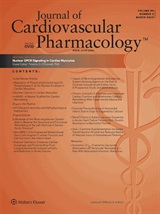 A group of researchers in China and the United States have retracted a 2014 paper in the Journal of Cardiovascular Pharmacology after discovering the data were fatally flawed.
A group of researchers in China and the United States have retracted a 2014 paper in the Journal of Cardiovascular Pharmacology after discovering the data were fatally flawed.
The article examined whether the anti-arrhythmia drug zacopride affected cardiac remodeling after heart attack, and came from Bo-We Wu, of Shanxi Medical University, in Taiyuan, and colleagues, including one author from Savannah, Georgia.
Here’s more from the notice for “Activation of IK1 channel by zacopride attenuates left ventricular remodeling in rats with myocardial infarction”:
We request to retract our article published in the October 2014 issue of the Journal of Cardiovascular Pharmacology, entitled “Activation of IK1 Channel by Zacopride Attenuates Left Ventricular Remodeling in Rats with Myocardial Infarction,” because of the flawed data presentations. We deeply apologize for making such serious and obvious mistakes in this article, which has the potential to mislead individuals working in the field. I (B-W.W.) discussed with all the coauthors of this article, and we all agree to retract this article. I write this letter to you on behalf of all coauthors, including Dr Ji-Min Cao and Dr Zhi-Qing Zhao.
We emailed Wu for comment, and will update if he responds.
The paper prompted a commentary in the same issue of the journal highlighting the “interesting” findings. But the author of the piece raised three questions about the work, first of which was “how safe is the conclusion?”
Not very, it seems.
Like Retraction Watch? Consider supporting our growth. You can also follow us on Twitter, like us on Facebook, add us to your RSS reader, and sign up on our homepage for an email every time there’s a new post.
I never get these retractions, honestly. How do scientists suddenly discover that their data is fatally flawed? This implies that the system of checks and balances before submission is totally flawed. In such circumstances, perhaps a review of the laboratories or even of the research institutes is required? It is evident that in such cases, there has to be institutional responsibility as well. While revising those policies, may I recommend, as background music, Beyonce’s “Flawless”:
Yeah, well, it’s like he said, “we deeply apologize for making such serious and obvious mistakes…”